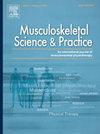在16-18岁的学校环境中,针对疼痛相关信念、知识和行为意图进行为期一天的疼痛科学教育活动的评估:一项混合方法、非随机对照试验
IF 2.2
3区 医学
Q1 REHABILITATION
引用次数: 0
摘要
公众对持续性疼痛的理解充满了误解。从长远来看,学校的疼痛教育可以提高公众对疼痛的认识。本研究评估了在一所16-18岁的学校进行为期一天的疼痛科学教育(PSE)公共卫生活动的影响。方法:这是一项多地点、非随机对照、混合方法的研究,有三个数据收集时间点:基线、干预后和三个月随访。参与者为年龄≥16岁的高中生。通过疼痛信念问卷(PBQ[有机和心理亚量表])、疼痛概念量表(COPI-Adult)、案例小品和半结构化访谈的反身性主题分析来评估疼痛信念、知识和行为意图。结果共纳入30例干预组(平均年龄16.6岁,女性占37%,男性占63%)和24例对照组(平均年龄16.9岁,女性占63%,男性占37%)。与对照组相比,参加疼痛教育活动与有机信念的降低[平均差异为- 4.4 (95% CI, - 6.0, - 1.9)]和心理信念的增加[4.6(2.7,6.4)]有关。与对照组相比,这代表了干预组对生物医学信念的转变。这种转变在3个月时部分持续。在copi -成人和病例小短文评估中也发现了类似的模式。半结构化访谈(n = 13)确定了对慢性疼痛的认识增加和对疼痛的不同程度的重新概念化,以实现生物心理社会理解。结论:参加为期一天的基于pse的公共卫生活动与改善关于持续性疼痛的知识、信念和行为意愿相关。本探索性研究支持对学龄儿童疼痛教育进行长期随访的可靠的混合方法随机对照试验的需要。本文章由计算机程序翻译,如有差异,请以英文原文为准。
An evaluation of a one-day pain science education event in a 16–18 years school setting targeting pain-related beliefs, knowledge, and behavioural intentions: A mixed-methods, non-randomised controlled trial
Background
Public understanding of persistent pain is fraught with misconceptions. Pain education in schools may improve public understanding long-term. This study evaluated the impact of a one-day Pain Science Education (PSE) public health event delivered in a 16–18 year old school setting.
Methods
This was a multi-site, non-randomised controlled, mixed-methods study with three data collection time points: baseline, post intervention, and three-month follow-up. Participants were high school students ≥16 years old. Pain beliefs, knowledge, and behavioural intentions were assessed with the Pain Beliefs Questionnaire (PBQ [organic and psychological subscales]), Concepts of Pain Inventory (COPI-Adult), a case vignette, and reflexive thematic analysis of semi-structured interviews.
Results
Thirty intervention (mean age 16.6 years, 37 % female, 63 % male) and 24 control group participants (16.9 years, 63 % female, 37 % male) were recruited. Attending the pain education event was associated with reductions in Organic Beliefs [mean difference −4.4 (95 % CI, −6.0, −1.9)] and increases in Psychological Beliefs [4.6 (2.7, 6.4)] compared to the control group. This represents a shift away from biomedical beliefs in the intervention group compared to the control group. This shift was partially sustained at 3 months. A similar pattern was seen for the COPI-Adult and case vignette assessments. Semi-structured interviews (n = 13) identified an increased awareness of chronic pain and varying degrees of reconceptualisation of pain towards a biopsychosocial understanding.
Conclusions
Attendance at a one-day PSE-based public health event was associated with improved knowledge, beliefs, and behavioural intentions regarding persistent pain. This exploratory study supports the need for a robust mixed-methods RCT of pain education for school children with long-term follow-up.
求助全文
通过发布文献求助,成功后即可免费获取论文全文。
去求助
来源期刊

Musculoskeletal Science and Practice
Health Professions-Physical Therapy, Sports Therapy and Rehabilitation
CiteScore
4.10
自引率
8.70%
发文量
152
审稿时长
48 days
期刊介绍:
Musculoskeletal Science & Practice, international journal of musculoskeletal physiotherapy, is a peer-reviewed international journal (previously Manual Therapy), publishing high quality original research, review and Masterclass articles that contribute to improving the clinical understanding of appropriate care processes for musculoskeletal disorders. The journal publishes articles that influence or add to the body of evidence on diagnostic and therapeutic processes, patient centered care, guidelines for musculoskeletal therapeutics and theoretical models that support developments in assessment, diagnosis, clinical reasoning and interventions.
 求助内容:
求助内容: 应助结果提醒方式:
应助结果提醒方式:


